After several months of planning, with many enthusiastic people giving their time and skills, we today signed an agreement with Daylesford Secondary College (DSC) to begin work on a 5-acre food forest at the school in 2013. This will be the fifth community garden in Daylesford established within 2 years, and a significant contributer to the growing community food system we are developing locally. Part community garden, part educative resource, the DSC Food Forest will be a first of its kind in Australia. It will have an emphasis on growing ethical, local food in an ecologically restorative way and will teach students and the wider community how to climate change proof our food supply while attend to greenhouse gases by growing locally, perennially and organically.
 |
| Drawing by Patrick Jones (click for bigger) |
The design group included DSC student Ruby Scott, DSC parent Alison Wilken, local permaculturalists Luke Pither, Patrick Jones, Paul Dempsey and Chris Wood, and consultation by permaculture co-originator David Holmgren and relocalisation activist Su Dennett. The generous and inspired school representatives have been teachers Liz Woodroofe, Karen Ruff, Eirinn Taylor and principal Tiffany Holt. Many others have given their time, support and knowledges to this project thus far, including the school's council, the Daylesford Neighbourhood Centre, numerous community gardeners and those who first sowed this seed.
All of us involved have thought it important to continue the great work the local primary schools have been doing to educate our kids in sustainable and ethical food production and really expand this knowledge at the secondary schooling level, where teenagers are often prey to corporate food predators.
We'll start looking for broader community support, volunteers and funding opportunities for the project in the new year. In the meantime our community can celebrate knowing that this project will begin to become a biophysical reality in 2013.













